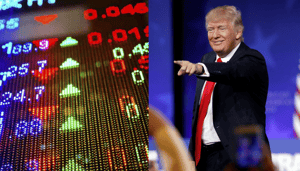
Since the election of Donald Trump, the stock market has gained over $5 trillion in equity value, with the Dow Jones rising over 24%, the S&P 500 nearly 20%, and the NASDAQ 27%.
The markets saw another catalyst last week as Congress made some fiscal progress. After a House vote, the Senate approved a 2018 budget bill on Thursday. Republicans passed tax cuts (or included them in the budget, rather) through budget reconciliation, which requires just a simple majority in the Senate. These cuts still have to be fully voted on, by Congress has set up the pins to knock them down later this year. And obviously tax cuts mean more money making it to the bottom line, hence why investors are bullish for stocks.
On Thursday, the markets set a new record before dipping slightly on Friday following a September’s job report showing a decrease in employment as a result of hurricane season. Not only did stocks set a new record high on Thursday, but the markets set a record for how many consecutive days they’ve closed at record highs.
According to the Wall Street Journal, “The S&P 500 closed at another fresh high Thursday, its longest streak of record closes in 20 years.”
Here’s more from the report: “The S&P 500 rose 14.33 points, or 0.6%, to 2552.07. The Dow Jones Industrial Average gained 113.75 points, or 0.5%, to 22775.39 — its seventh consecutive day of gains. The Nasdaq Composite added 50.73 points, 0.8%, to 6585.36 for its eighth straight day of advances.”
The market has also been unusually peaceful in terms of volatility. The VIX (known as the “fear index”) historically has traded around 18.68 (for some context, during the 2008 financial crisis it peaked around $60), but has spent most of the time since the election hovering around 10.

The VIX rarely falls below 10 – and yet almost a majority of closes below 10 in the history of the index have occurred under the Trump presidency.
Volatility Index closes below 10 for the 6th straight day. The least volatile October in history thus far. $VIX pic.twitter.com/56yOKdcZHx
— Charlie Bilello (@charliebilello) October 4, 2017
It hit an all-time closing low last Thursday, at $9.19. It’s an oddity, because there’s historically been an “October effect” in which volatility tends to trade highest in October over any other month in the year. There have been significant VIX spikes in October in every one of the past 10 years – except this year. In fact, the VIX has never closed below 10 in September or October in history, and yet has done so 6 times last month, and every trading day in October as of writing.

Vix has hit an all-time closing low https://t.co/HLWrvMuDYp pic.twitter.com/PGmx58ugWY
— MarketWatch (@MarketWatch) October 6, 2017
So far, so good? While no market is immune from ups and downs, if these trends continue for another three and a half years, the American public will certainly vote to extend them another four in 2020.
Share this great news about the stock market on Facebook now!
